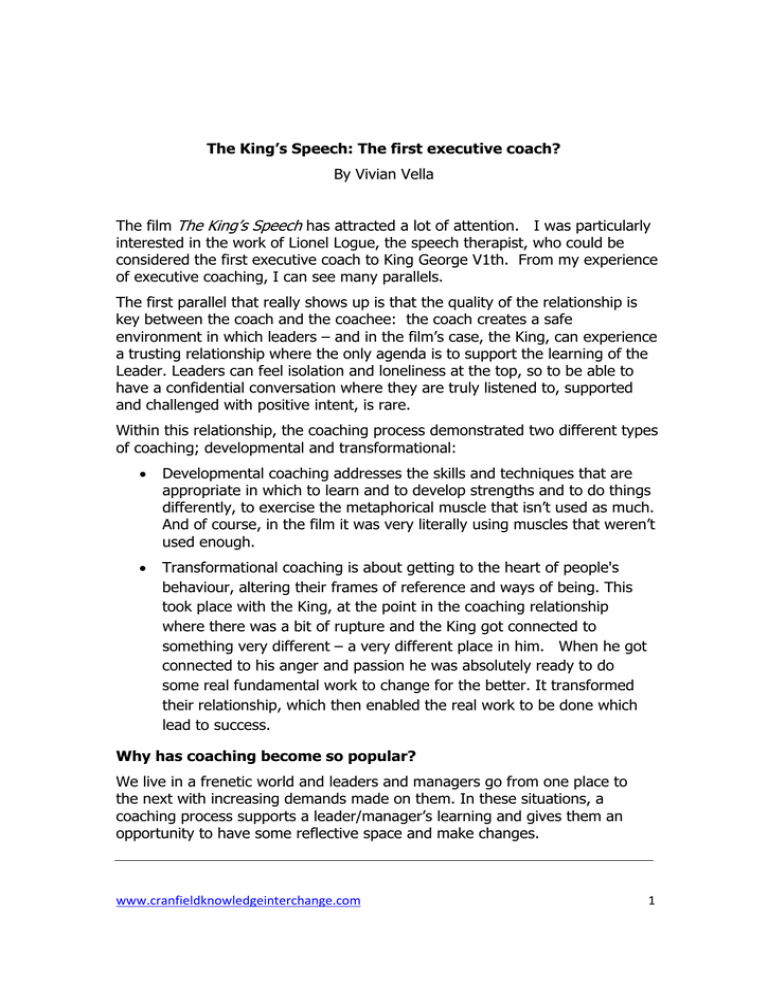The King’s Speech: The first executive coach? The film
advertisement

The King’s Speech: The first executive coach? By Vivian Vella The film The King’s Speech has attracted a lot of attention. I was particularly interested in the work of Lionel Logue, the speech therapist, who could be considered the first executive coach to King George V1th. From my experience of executive coaching, I can see many parallels. The first parallel that really shows up is that the quality of the relationship is key between the coach and the coachee: the coach creates a safe environment in which leaders – and in the film’s case, the King, can experience a trusting relationship where the only agenda is to support the learning of the Leader. Leaders can feel isolation and loneliness at the top, so to be able to have a confidential conversation where they are truly listened to, supported and challenged with positive intent, is rare. Within this relationship, the coaching process demonstrated two different types of coaching; developmental and transformational: • Developmental coaching addresses the skills and techniques that are appropriate in which to learn and to develop strengths and to do things differently, to exercise the metaphorical muscle that isn’t used as much. And of course, in the film it was very literally using muscles that weren’t used enough. • Transformational coaching is about getting to the heart of people's behaviour, altering their frames of reference and ways of being. This took place with the King, at the point in the coaching relationship where there was a bit of rupture and the King got connected to something very different – a very different place in him. When he got connected to his anger and passion he was absolutely ready to do some real fundamental work to change for the better. It transformed their relationship, which then enabled the real work to be done which lead to success. Why has coaching become so popular? We live in a frenetic world and leaders and managers go from one place to the next with increasing demands made on them. In these situations, a coaching process supports a leader/manager’s learning and gives them an opportunity to have some reflective space and make changes. www.cranfieldknowledgeinterchange.com 1 Research suggests that 70% of effective learning is on the job learning and the coaching process meets the need to learn the most from live and relevant work situations. When you set up an initial contract with someone you define certain goals and objectives that you want to achieve. Respected executive coaching expert Peter Hawkins refers to the coaching conversation as ‘a robust dialogue born out of fearless compassion’, which accurately sums up coaching conversations. Realistically, most people simply don’t often get that sort of quality in a conversation helping them to learn. Don’t you become dependent on the coach? Normal practice would be to contract at the beginning with the coachee, and agree what it is that you will address in terms of their learning, how many sessions you would want to initially contract, this gives a checkpoint that could be re- contracted at any point and sets out some boundaries. A focus too, of supporting the coachee in their learning, is that they become independent learners and not to foster a co-dependency. Part of the role of a coach’s supervisor is to check this is not happening. There is much that coaching as a learning and development process can achieve and The King’s Speech gives some very useful pointers. At its best, coaching is effective in helping individuals to, amongst many things: • Develop a more effective and impactful communication style • Manage challenging relationships more successfully • Challenge existing beliefs to increase self-confidence and self-esteem • Lead and manage transitions We may not be a king with a speech impediment, but coaching can help us find our voice. Vivian Vella Visiting Programme Tutor, the Praxis Centre Cranfield School of Management www.cranfieldknowledgeinterchange.com 2





